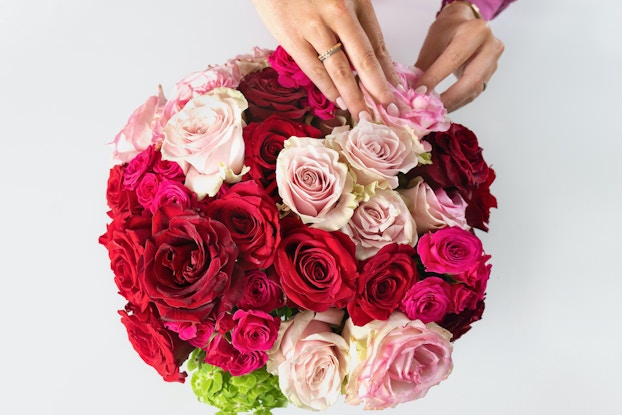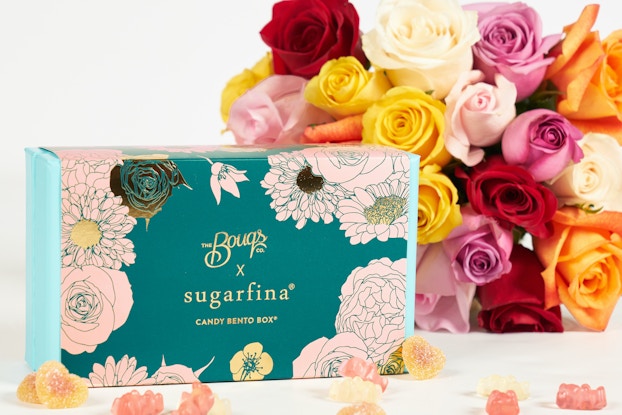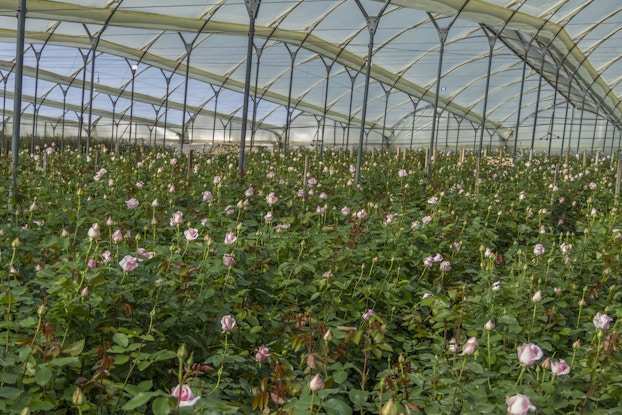
Why it matters:
- The floral industry bloomed amid the pandemic, with global sales poised to reach $57 billion by 2024.
- Online merchants have gained big market share, boasting $5.2 billion in U.S. floral sales, compared to the $5.8 billion in revenue generated by the brick-and-mortar florist business.
- Startups from BloomsyBox, The Bouqs Co. and Bouquet Box to industry giant 1-800-Flowers are tapping fresh ways to drive business, including subscription memberships, do-it-yourself floral kits and high-profile partnerships, like one with fashion designer Jason Wu.
Mother’s Day flower deliveries this year could come with an added surprise for Mom — the discovery that today’s floral industry isn’t the one she grew up with.
Mom might get a floral subscription gift of fresh bouquets delivered every month, or a do-it-yourself floral arranging kit, or straight-from-the-farm flowers timed to bloom after arrival, or an invitation to participate in a Zoom flower-arranging class with her daughters and granddaughters.
Floral delivery startups, and one of the oldest and best-known brands in the industry, are competing to deliver new ways to sell and send flowers.
Miami-based flower subscription delivery company BloomsyBox saw its orders grow by 300% in 2020 as stuck-at-home customers looked both to brighten up their homes and send love to distant friends and family.
One of the fastest-growing disruptors, The Bouqs Co., expects to deliver eight million stems this Mother’s Day, and is seeing monthly gains, compared to the previous year, of 50% to 100%, with annual revenue of more than $100 million.
A three-month-old startup, Bouquet Box, has seen such strong demand for its do-it-yourself flower-arranging kits that it is already profitable.
Startups aren’t the only ones seeing growth in the floral category.
1-800-Flowers.com—which, during the pandemic, began hosting virtual, interactive floral workshops, with flowers delivered to thousands of participants and has launched new ways of connecting with customers—in April reported another record quarter of growth, with revenue up 70.1%. The company expects to reach more than $2 billion in revenue this fiscal year.
The global market for cut flowers, house plants and landscape plants topped $42 billion in 2019, according to a report on PetalRepublic.com, a website specializing in the floral industry. Global sales are expected to exceed $57 billion by 2024.
According to research firm IBISWorld, revenue for online floral sales in the U.S., at $5.2 billion, is quickly catching up to the $5.8 billion revenue of the brick-and-mortar florist business.
The shift to online shopping “will mean fewer walk-ins for traditional florist shops and more sales for successful floral websites,” IBISWorld reported.
[See other types of businesses that have flourished amid the pandemic.]

The Bouqs Co.: Growth via cutting out the middleman and pricing ‘no one else can touch’
The Bouqs Co. was founded nine years ago as a way to make flower deliveries both affordable and sustainable by cutting out the middleman and arranging direct shipments from a network of flower farms. Co-founder and CEO John Tabis told CO— that the company sees three primary growth opportunities: expanding subscription deliveries, adding gift items like candy, fruit and candles to flower deliveries and expanding internationally.
The Bouqs Co. initially generated most of its business as one-time orders, “but subscriptions have really taken off over the last two years,” Tabis said, growing 300% to 400% year over year. That’s due to “pricing no one else can touch,” with $36 for its smallest bouquet, and flexibility that allows customers to skip a month or redirect a monthly bouquet to another person’s address as a gift, he said.
The Bouqs Co. is also seeing strong growth in the houseplant category.
“The #plantparent trend is a real thing,” he said. “Plants have grown as a percentage of our assortment very quickly. We sell out of most of our plant collections in just a couple of weeks.”

BloomsyBox: Staying true to the subscription model
BloomsyBox was launched in 2015 as a subscription delivery service, which is still more than 90% of its business, with over 100,000 subscription customers.
The company takes the fresh-from-the-farm model to the next level by owning the South American farms that source most of the flowers it delivers. “That gives us control over the whole process and a lot of freedom when it comes to selecting the varieties we sell,” founder and CEO Juan Palacio told CO—. Flowers that have a long “vase life” after being cut, and bloom fully after they arrive, make up BloomsyBox’s curated offerings, he said.
The company is looking to grow this year with subscription offers for houseplants and fresh cut greens. It also plans to expand internationally in the United Kingdom later this year.
BloomsyBox adopted the subscription model as a way of building a more predictable business than the holiday-driven demand spikes that challenge traditional floral delivery, Palacio said.
The startup is seeing new competition as brands formerly focused on one-time deliveries are adding subscriptions. Palacio believes his early adoption of the subscription model, the lessons the company has learned about keeping repeat customers engaged and happy and its extensive logistic footprint will give BloomsyBox an edge.
Sales grew by 300% last year, he said.
“I’m glad we were one of the first in the subscription market,” he said. “We’re going to be staying true to subscription.”
[Read here on adding a subscription membership to your business.]
According to research firm IBISWorld, revenue for online floral sales in the U.S., at $5.2 billion, is quickly catching up to the $5.8 billion revenue of the brick-and-mortar florist business.
Bouquet Box: Delivering DIY-joy along with flowers
Courtney Sixx, a do-it-yourself influencer known for her How2Girl blog, radio show and social media posts, was inspired to create a flower-arranging kit and flower delivery company after trying out an at-home meal prep kit.
“I thought, oh my gosh, wouldn’t it be so cool if I could do the same thing but for flowers, and make it really user friendly and make it fool-proof, and deliver everything you need — the tools, curated flowers — to everyone around the country,” she told CO—.
Sixx and partner Amy Nebens teamed up with floral designers from Mark’s Garden, the boutique Los Angeles flower shop in high demand for celebrity weddings and Hollywood events, and created a line of premium arrangements customers could create on their own.
Customers receive a tool kit before the flowers arrive with a reusable vase, a grid for placing the flowers in the vase in a pattern, floral shears, a ruler and a stem stripper for removing leaves and thorns. The flowers arrive with an instruction card with directions like “Trim the lavender roses to nine inches and place two in box one on the grid and three in box nine.”
Floral kits start at $99 and enable buyers to create arrangements that would cost $225 to $250 from a designer. The number of flowers per arrangement averages about 45 and can go up to 55 to 60 flowers.
Bouquet Box launched in February, and demand has been so strong that the company already is profitable, Sixx told CO—.
“People love being creative, and they love DIY and they love flowers. It’s a winning combination,” she said.
Sixx said she was surprised that many customers immediately signed up for repeat subscription orders, because she originally expected most of her orders would be one-time purchases.
Customers are posting on social media and telling her how relaxing and therapeutic flower arranging is for them, she said.
Bouquet Box plans to expand into categories like DIY bouquets for weddings, bridal and baby showers and other events.

1-800-Flowers.com: 45 years of pivoting
“We consider ourselves a 45-year-old startup, and we keep moving faster and faster every year,” 1-800-Flowers.com CEO Chris McCann told CO—.
The company, which started in 1976 with a single flower shop in Manhattan, has survived close to five decades of disruption, and aims to stay ahead of trends rather than respond to them.
In the 1980s it pioneered “telephonic commerce” with 1-800 phone orders. In 1990 it was the first company to sell products on AOL, and it launched its first website in 1995. In 2016 it became one of the first companies to sell on Facebook Messenger.
It responded quickly to pandemic-related shifts last year by joining with online event-hosting platform Alice’s Table to hold virtual flower-arranging workshops that often draw more than 1,000 participants per class.
The brand recently partnered with floral-inspired fashion designer Jason Wu to create a Wild Beauty floral collection.
And 1-800-Flowers has expanded its customer engagement and outreach with social media campaigns and by creating community networks on its website where customers dealing with issues like parenting or eldercare can join in group discussions and share support.
“Ultimately what we’re always trying to do with our customer base is deepen the relationship,” McCann told CO—. “To do that it’s got to be beyond the transaction.”
He sees opportunities to continue the company’s strong growth by leveraging its network of local florists to expand same-day gift delivery options to include products from Harry & David or Shari’s Berries, or the other gourmet food and gift companies under the 1-800-Flowers.com umbrella.
The company’s long history of reinvention gives it an edge against the younger disruptors, McCann said. “Because of our culture of innovation, we tend to move faster and at a larger scale than the competitive landscape,” he said.
CO— aims to bring you inspiration from leading respected experts. However, before making any business decision, you should consult a professional who can advise you based on your individual situation.
Follow us on Instagram for more expert tips & business owners' stories.
CO—is committed to helping you start, run and grow your small business. Learn more about the benefits of small business membership in the U.S. Chamber of Commerce, here.

What can membership do for your business?
Gain tools to stay informed, competitive, and connected by becoming a U.S. Chamber of Commerce member. Membership gives you direct access to expert policy insights, economic updates, and exclusive resources designed to help your business thrive. From behind-the-scenes analysis from D.C. to exclusive discounts and expert support, U.S. Chamber membership helps you navigate change and seize new opportunities.







